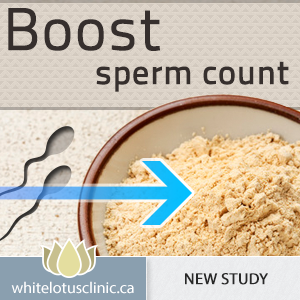Ayurvedic herb ashwagandha was recently studied for its effects in men with low sperm count, also known as oligospermia. Male infertility accounts from anywhere from 30-50% of infertility worldwide. IVF is an expensive procedure that is often used to treat male factor infertility, however, there is good evidence that many natural supplements and antioxidants may improve the sperm count and as such, improve fertility.
This double blind, randomized, placebo-controlled trial investigated a group of 46 male patients between 26 and 40 years of age who had low sperm count, between 5-20 million/ml. The group receiving the treatment were given 225 mg per day of a full spectrum root extract of ashwagandha.
Ashwagandha is known as “Indian Ginseng”, and has been used for approximately 6000 years as an adaptogen in Ayurvedic medicine. It is touted for its ability to combat stress, fatigue and disease. Ashwagandha root has also been used traditionally as an aphrodesiac and has been found in numerous studies to increase the secretion of testosterone in humans and animals.
It is for this reason that I recommend that women with Polycystic Ovarian Syndrome do NOT use Ashwagandha for stress, fertility or adrenal health (even though it is present in many fertility formulas for women). Women with PCOS already have high levels of male hormones.
Surprisingly, after just 90 days of therapy, the study found that the ashwagandha group experienced a whopping 167% increase in the amount of sperm when compared to the control group. It was also found that the ashwagandha group experienced a 53% increase in sperm volume and a 57% increase in motility.
Serum testosterone also increased in this study by 17%, and LH (luteinizing hormone) by 54%. It is quite clear that ashwagandha is a tonic to the male reproductive system when the information from this study and previous studies are combined.
It is thought that ashwagandha works not only through improving male hormone parameters, but also by reducing stress. it is known that stress increases the amount of radical oxygen species that can damage the sperm. According to studies, ashwagandha may lower the stress response and as such reduce the amount of oxidative stress that decreases sperm production.
In this case it appears that traditional wisdom may be correct, in finding that this simple root has significant effects in improving the production of male hormones and sperm.
References
- Ambiye VR, Langade D, Dongre S, Aptikar P, Kulkarni M, Dongre A. Clinical Evaluation of the Spermatogenic Activity of the Root Extract of Ashwagandha (Withania somnifera) in Oligospermic Males: A Pilot Study. Evid Based Complement Alternat Med. 2013;2013:571420
- M. K. Ahmad, A. A. Mahdi, K. K. Shukla et al., “Withania somnifera improves semen quality by regulating reproductive hormone levels and oxidative stress in seminal plasma of infertile males,” Fertility and Sterility, vol. 94, no. 3, pp. 989–996, 2010.
- A. A. Mahdi, K. K. Shukla, M. K. Ahmad et al., “Withania somnifera improves semen quality in stress-related male fertility,” Evidence-Based Complementary and Alternative Medicine, vol. 2011, Article ID 576962, 9 pages, 2011.





